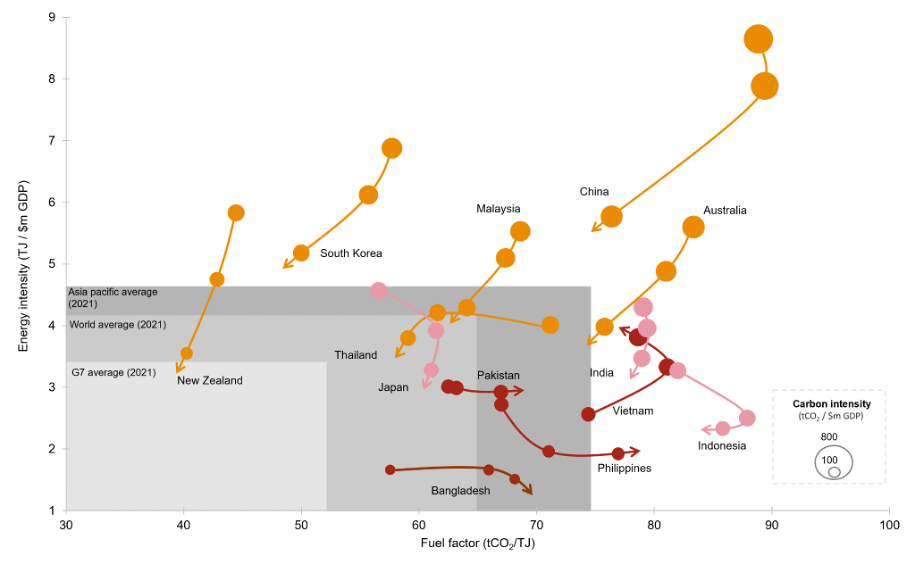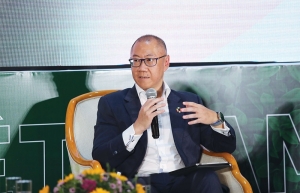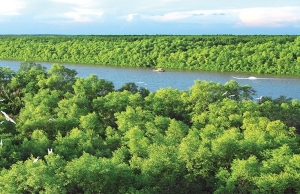Asia-Pacific outperforms global decarbonisation in 2021
PwC's Net Zero Economy Index 2022 reveals the Asia-Pacific region achieved a decarbonisation rate of 1.2 per cent on average in 2021. This indicates its energy-related CO2 emissions per unit of GDP generated are falling. In the same period, the world’s overall decarbonisation effort was 0.5 per cent, a massive gap towards the 15.2 per cent rate required to limit global warming to 1.5 degrees Celsius above pre-industrial levels.
PwC’s Net Zero Economy Index tracks the progress that countries have made to reduce energy-related CO2 emissions and decarbonise their economies. This is done by measuring levels of energy consumption relative to GDP and the carbon content of that energy.
The index shows that nine out of the 13 Asia-Pacific economies reduced their carbon intensity in 2021, however, only two – New Zealand and Vietnam – exceeded the decarbonisation rate targets implied by their nationally determined contributions. New Zealand reduced its carbon intensity the most at 6.7 per cent in 2021, followed by Malaysia (4.0 per cent), Vietnam (3.4 per cent), and Australia (3.3 per cent).
Global and national targets need to be translated into policy actions. Encouragingly, Asia-Pacific governments are putting some of these in place. However, for Asia-Pacific to keep to the 1.5 degrees target, decisive action is required on the policy front.
This includes pairing renewable energy targets with coal phase-out plans, promoting energy efficiency with electrification, integrating carbon pricing policies with innovation, as well as scaling up clean tech and ensuring a just transition.
 |
| Energy intensity, fuel factor, and carbon intensity of Asia-Pacific economies for 2001, 2011, and 2021. The colours show the different pathways Asia-Pacific economies have taken to deliver emissions reductions |
While policymakers are under pressure to ensure a secure and affordable energy supply, there is an opportunity to use innovation to strengthen the business case for net-zero investment. The rise in energy prices and threats to supply have created a rush to fossil fuels in the short term but strengthened the case for investment in renewable energy capacity over the long term.
Similarly, the financial case for energy efficiency has strengthened, especially in energy-consuming and hard-to-abate sectors. Businesses will be looking at ways to consume less and to do it more efficiently, signalling a possible turning point in how they think about energy.
The decarbonisation narrative is shifting from ambition to action. However, this year’s index shows significant gaps in both areas that must be acknowledged and addressed at COP27 and beyond. Closing the gaps would be a turning point for Asia-Pacific to gain a competitive advantage in the global race to net-zero.
 | ESG promises must be backed up by genuine progress The importance of environmental, social, and governance criteria (ESG) factors to businesses has been extensively acknowledged. Andrew Chan, Sustainability Strategy & Transformation leader at PwC Asia-Pacific’s Sustainability Centre of Excellence, explained to VIR’s Celine Luu how to address ESG concerns across a broad spectrum of industries. |
 | Stepping up ESG for socioeconomic gains Both businesses and financial institutions in Vietnam are stepping up their journey in environmental, social, and governance (ESG) criteria, and reinforcing commitments to foster sustainability. A fresh PwC ESG Readiness Report for 2022 shows significantly upbeat figures about how businesses in Vietnam are approaching these matters. |
 | Action plans for high-income and low-carbon future About $184 billion at current value – that’s the estimate of the potential investment opportunities for the private sector over the next couple of decades to help Vietnam on a climate-resilient and net-zero development pathway. |
What the stars mean:
★ Poor ★ ★ Promising ★★★ Good ★★★★ Very good ★★★★★ Exceptional
Related Contents
Latest News
More News
- Trung Nam-Sideros River consortium wins bid for LNG venture (January 30, 2026 | 11:16)
- Vietnam moves towards market-based fuel management with E10 rollout (January 30, 2026 | 11:10)
- Envision Energy, REE Group partner on 128MW wind projects (January 30, 2026 | 10:58)
- Vingroup consults on carbon credits for electric vehicle charging network (January 28, 2026 | 11:04)
- Bac Ai Pumped Storage Hydropower Plant to enter peak construction phase (January 27, 2026 | 08:00)
- ASEAN could scale up sustainable aviation fuel by 2050 (January 24, 2026 | 10:19)
- 64,000 hectares of sea allocated for offshore wind surveys (January 22, 2026 | 20:23)
- EVN secures financing for Quang Trach II LNG power plant (January 17, 2026 | 15:55)
- PC1 teams up with DENZAI on regional wind projects (January 16, 2026 | 21:18)
- Innovation and ESG practices drive green transition in the digital era (January 16, 2026 | 16:51)

 Tag:
Tag:




















 Mobile Version
Mobile Version